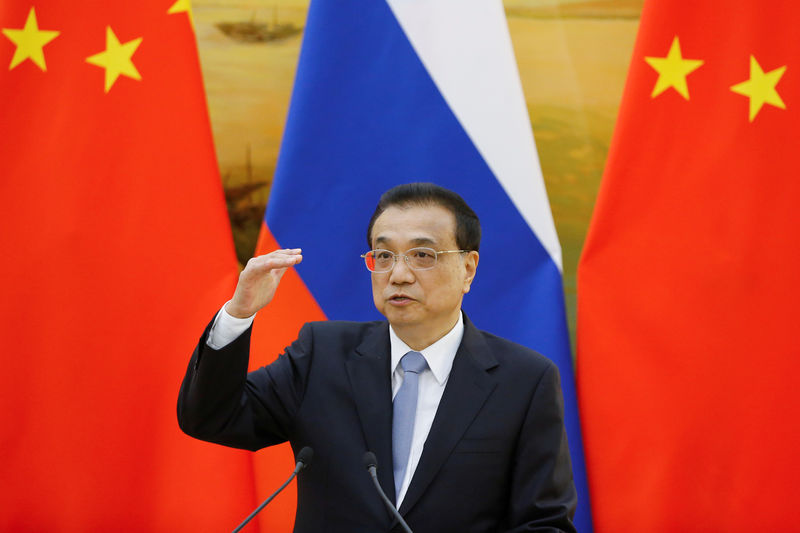By John Geddie and Manuel Mogato
SINGAPORE/MANILA (Reuters) - China will further open its economy in the face of rising protectionism, Premier Li Keqiang said as he arrived in Singapore on Monday for meetings with Asia-Pacific leaders that will focus on speeding up work on a major new trade pact.
Li's remarks in an article in Singapore's Straits Times newspaper came as Singapore's Prime Minister Lee Hsien Loong called for more regional integration, saying multilateralism was under threat from political pressures.
"China has opened its door to the world; we will never close it but open it even wider," Li said in the article, in which he called for an "open world economy" in the face of "rising protectionism and unilateralism". He did not directly refer to China's bruising trade war with the United States.
Notably absent from this week's meetings is U.S. President Donald Trump, who has said several existing multilateral trade deals are unfair, and has railed against China over intellectual property theft, entry barriers to U.S. businesses and a gaping trade deficit.
Vice President Mike Pence will attend instead of Trump, and Russian President Vladimir Putin, Indian Prime Minister Narendra Modi and Japanese Prime Minister Shinzo Abe are among those also expected to join Li and the ten-member Association of Southeast Asian Nations (ASEAN).
It was not clear if Li and Pence will hold separate talks on the sidelines of the meetings, which would be a prelude to a summit scheduled between Trump and Chinese President Xi Jinping at the end of the month in Buenos Aires.
The encounter, if it happens, would come on the heels of high-level talks in Washington where the two sides aired their main differences but appeared to attempt controlling the damage to relations that has worsened with tit-for-tat tariffs in recent months.
Li said China would "work with all relevant parties to expedite" negotiations on the Regional Comprehensive Economic Partnership (RCEP), showcased to be a free trade deal that will encompass more than a third of the world's GDP.
The pact includes 16 countries, including ASEAN nations, Australia, China, India, Japan, New Zealand and South Korea, but not the United States.
Regional diplomats said substantial work had been done on the trade deal, but it was not likely to be fully concluded until next year.
"During the summit, the leaders would express their commitment to conclude the negotiations, because this is very important for the region especially in view of rising trade tensions," Junever Mahilum-West, a senior official in the Philippines foreign ministry, told reporters last week.
The draft of a communique to be issued by RCEP nations later in the week, which was reviewed by Reuters, said the group would instruct "ministers and negotiators to work toward the full conclusion of the RCEP negotiations in 2019".
Earlier, in remarks at a business summit on Monday ahead of this week's meetings, Singapore's Lee said:
"ASEAN has great potential, but fully realizing it depends on whether we choose to become more integrated, and work resolutely toward this goal in a world where multilateralism is fraying under political pressures".
Lee has previously warned that the U.S.-China trade war could have a "big, negative impact" on Singapore, and the city-state's central bank has warned it could soon drag on the economy.

Also on Monday, the ten-member ASEAN group reached its first ever deal on e-commerce aimed at helping boost cross-border transactions in the region.